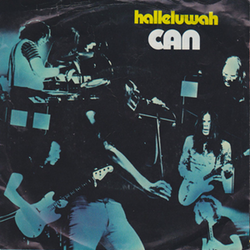| "Halleluwah" | |
|---|---|
 1971 German single cover | |
| Single by Can | |
| from the album Tago Mago | |
| A-side | "Turtles Have Short Legs" |
| Released | 1971 |
| Recorded | Schloss Nörvenich, Cologne |
| Genre | |
| Length |
|
| Label | United Artists |
| Songwriter | Can |
| Producer | Can |
"Halleluwah" (alternatively titled "Halleluhwah" on some post-1989 releases) is a song by the krautrock band Can, from their 1971 album Tago Mago . The track, which originally took up a whole side of long-playing vinyl record, lasts for 18 minutes and 28 seconds and is characteristic of the band's sound around 1971 in that it features a vast array of improvised guitars and keyboards, tape editing, and the rhythm section "pounding out a monster trance/funk beat". [4] The drum beat for which the song is famous is repeated almost continuously by Jaki Liebezeit, with only minor variations, throughout the course of the 18-minute jam. In one line of the song, Damo Suzuki's lyrics mention all the songs from side one of Tago Mago: "mushroom head, oh yeah, paper house."
Contents
The original UK pressing of Tago Mago misprinted the song's title as "Hallelujah" both on the LP's centre label and on the back flap of the album jacket.